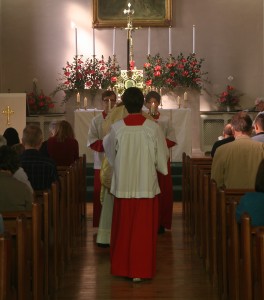As we celebrated the feast of Corpus Christi on Sunday, Fr Neil took the opportunity to remind us how to receive communion. Here is the text that was given out:

The Church teaches us that the Mass is the source and summit of the Christian life. From this follows the essential importance of our participation at the Mass every week; this is not simply a precept of the Church but a commandment of God Who wills His People join together in worship every Sunday, the Lord’s Day. The best and ultimate expression of our participation is Eucharistic Communion. Our Holy Communion with Christ at Mass is an expression of our faith in His real presence in the Sacrament; it signifies our communion with one another; and it is an assent to the full body of teaching of the Catholic Church; this is the meaning of the Amen we pronounce at the moment of reception. There are often people at Mass who cannot receive for various reasons, either because they are not Catholic, have not received first Holy Communion or because there are spiritual obstacles which have not been overcome. Each of us participates in the Mass according to our capacity, but it is our presence at Mass that is important wether or not we receive Holy Communion. There has evolved the custom, for those not receiving, to come forward and with a clear indication (e.g. arm placed on our shoulder) to receive the sign of the Cross; this is not precisely a blessing – the blessing is given to everyone at the end of Mass – but a symbol of the touch of Christ at that moment.
In preparation for Holy Communion, if we are receiving, we should have fasted from food and drink (except water) for one hour. This is not necessary if we are elderly or have to take medicine. Above all, it is necessary that we be in a state of grace; this means that if we are conscious of serious sin we should have gone to sacramental Confession first.
In receiving Holy Communion the universal norm of the Church is reception upon the tongue; in England there is the Indult (a special permission) for receiving Communion in the hand as well. Whichever form we choose, it is important that we indicate clearly and receive with proper care and reverence. Before we receive, we should make an act of adoration in recognition of the One we are receiving; this takes the form of a genuflection or deep bow as the person in front of us is receiving. St Augustine reminds us: Adore first, what you are to receive. If receiving upon the tongue, the proper manner is to extend our tongue so that the Sacred Host can be placed upon it easily; the Host should not be pecked-at or snatched with the lips; moving targets are also difficult to communicate! If receiving in the hand, this is done by placing one hand upon the other, receiving the Host in the palm and then placing it into the mouth carefully before moving away. Children especially, are asked to ensure that they raise their hands to a suitable height and stand close to the priest or extraordinary minister. The Host should not be snatched or walked-away with; we ask everyone to be vigilant in this. In whichever manner we receive we pronounce a distinct and audible Amen.
The period after Holy Communion is for private prayer, and if there is a Communion chant or hymn, this is followed by a period of silent thanksgiving. It is a help and kindness to everyone else at Mass if a prayerful silence is observed, remembering that this time is an intimate moment of Communion with Jesus, our Lord and God. Those who have not received Communion might like to make what is called a Spiritual Communion at this point, using a formula such as:
“I wish Lord to receive You now, with the purity, humility and devotion with which Your
most holy Mother received You, and with the spirit and fervour of the Saints……”
There is nothing greater in the whole of our Catholic Faith that the Presence of Jesus with us at Mass and in Holy Communion. We can never grow too-used to this Gift and Mystery and by continually reminding ourselves of Who it is we receive, then we will approach the Altar with ever greater awareness, faith and devotion.










 Posts
Posts